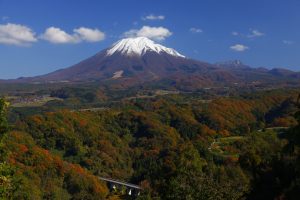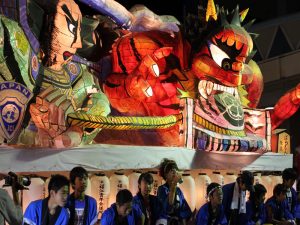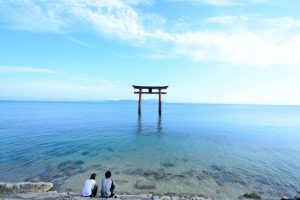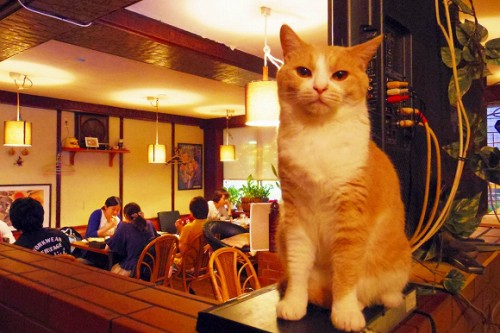JET Prefecture Round up! 09.25.17
By Suzanne Bhagan (Tottori Prefecture)
Konnichiwa past and present JETs! This autumn’s already steaming up with a host of events to keep you occupied. Here are some highlights you shouldn’t miss!
When: 1 October
Where: Ojiya, Niigata Prefecture
Forget human sumo wrestlers! Head to Tsunotsuki or bull versus bull wrestling in Ojiya to see which beast comes out on top!
When: 30 September
Where: Saihaku, Tottori Prefecture
It’s already fall so you know what time that is: time to tackle Daisensan, the tallest mountain in the Chugoku region!
Block 4 Welcome Party: Odo Beach Bonfire
When: 29 September
Where: Itoman, Okinawa Prefecture
Calling all Block 4 peeps! Bring some booze and marshmallows and get to know one another!
When: 30 September
Where: Mutsu, Aomori Prefecture
Cozy up with live music from over 20 local artists and groups and nosh some tasty food at this music festival.
When: 29 September – 1 October
Where: Fukue, Nagasaki Prefecture
Head to one of the main Goto islands for Nebuta parades, fireworks, dances, and a whole lotta fun!
When: 24 September – 1 October
Where: Miyako, Fukuoka Prefecture
Join in one of Kyushu’s three major float festivals that’s famous for its “fighting floats” where competing floats hit one other!
JET Prefecture Round up! 09.18.17
By Suzanne Bhagan (Tottori Prefecture)
Hey, everyone! It’s already past the middle of September and there’s a national holiday (Autumnal Equinox Day on 23 September) coming up. Here’s what’s going on in Japan’s JET community this week and the next!
When: 23 September – 24 September
Where: Oirase Town, Aomori Prefecture
Snap the “living dolls” that ride the giant floats during the Shimoda Festival in Oirase!
When: 30 September
Where: Minamiaso, Kumamoto Prefecture
Pack a tent. It’s party time on the side of the world’s largest caldera for the first ever Kuma Fest!
Hiroshima AJET’s Annual Whitewater Rafting Trip
When: 29 September – 1 October
Where: Yoshino River, Kochi Prefecture
Block 9 peeps, get your paddles ready! Hiroshima AJET is hosting its yearly whitewater rafting in Shikoku.
When: 30 September
Where: Miyakonojo, Miyazaki Prefecture
September can be tough with classes, speech contests, and sports day so rustle up a team and head to the MAJET Trivia Night! It’s also a potluck so bring something yummy to share!
When: 24 September
Where: Kobe, Hyogo Prefecture
At this sesh, Hyogo JET’s Book Club will dissect Howl’s Moving Castle by Diana Wynne Jones. P.S. it isn’t considered cheating if you can’t finish the book and only watch the movie instead.
Kagawa AJET Moon Viewing and Party
When: 23 September
Where: Marugame Castle, Kagawa Prefecture
Forget yesterday’s eclipse. Kagawa AJET hosts a moon viewing party at Marugame Castle for the autumnal equinox! Take a tour of the castle, picnic, and enjoy the scenery!
When: 30 September
Where: Kamaishi, Iwate Prefecture
Get your drink on at the first ever Kamaishi Wine Festival! It takes place during the Kamaishi Magokoro Food Festival and the Rugby World Cup 2019 Fan Zone Rehearsal Event so drink up, eat up, and join in a game of street rugby!
When: 30 September – 1 October
Where: Maibara, Shiga Prefecture
Get ready for a legendary weekend of mad views and copious amounts of Pocari Sweat as Shiga AJETs cycle 150 km (93 miles) around Lake Biwa!
When: 30 September
Where: Nakagami, Okinawa Prefecture
An exciting night of dance performances: hip hop, belly dance, tribal fusion belly dance, jazz dance, popping, flamenco, and more!
JETs in Academia: Understanding Privacy in Japan
Nathaniel Simmons (Nara-ken, 2007-2009) is currently a communication professor at Western Governors University and lives in Columbus, OH, USA. He teaches a variety of intercultural, interpersonal, and health communication courses. He has researched and published several scholarly articles regarding privacy management between foreign English teachers and Japanese co-workers in Japan and is currently working on turning his research into a book.
What is private in Japan?
If I tell my co-workers I have hemorrhoids, diarrhea, or need to go to the OBGYN will they tell everyone else?
These may not be questions JETs think about when they first go to Japan. It also may not be something JETs consider when they are ill and trying to gain medical care or just discussing information (i.e., relationship status) about themselves with their co-workers.
The reality is Japanese cultural conceptions of privacy might be different than many JETs’ expectations. Depending upon how individualist or collectivist your home country is will influence how privacy is interpreted, expected, and maintained. The concept of “what is private” or “privacy” differs cross-culturally, as do the ways in which privacy values are expressed.
Japan is no exception.
Japan has been largely classified as a collectivistic culture. As you know from your own experiences in Japan, the group matters more than the individual. In other words, in Japan the “we” wants and goals come before the “I” or “me” wants and goals. For collectivists, the very notion of privacy might be viewed as selfish due to an individual’s wants and goals taking precedent over the group’s desires.
Ever notice that privacy is in katakana, the Japanese syllabary used for foreign words? Puraibashi, or プライバシー, is taken directly from the English word for “privacy.” Since traditional Japanese language has no word for privacy, a unique cultural conception of privacy emerged. For example, the idea that one has “the right to be left alone” might signal a lack of cooperativeness with the group and an inability to work well with others. Additionally, controlling one’s privacy information might be perceived as an excess of mistrust. Even Japanese scholars have commented that gaijin might perceive the group interdependence of Japanese people as “suffocating.”
Japanese language use two distinct, yet interrelated meanings of Japanese privacy: shakai ( 社会), or “public,” and seken (世間), or “world/society.” Such terms stress the importance of relationships, interdependence, and group harmony. Shakai contributes to negative aspects of crimes being withheld from the media in order to protect victims and their families. If one was to “break shakai” it would involve speaking publically about private matters which might harm another’s reputation. Seken emphasizes human relations and allows Japanese people the ability to “understand” or at least “explain” what went wrong in a given situation. To the foreign eye, this might look intrusive, or like “gossip,” as one tries to understand one’s home life or culture to explain a tragic event.
As JETs operate on differing values of privacy, this might result in individuals feeling “violated” or “exposed.” Perceived privacy violations can lead to relationship withdrawal, isolation, and negative assumptions/stereotypes about one’s co-worker or Japan in general. Throughout my research, gaijin English teachers reported feeling that their co-workers invaded/violated their privacy expectations. In other words, if they told someone something, it was then told to someone else, who then told someone else…etc. You get the point. In my research, gaijin felt victimized when people knew things about them that they didn’t disclose (i.e., So and so sensei told me you went to the doctor and are on X medication), even if it was something positive (i.e., I heard your dental checkup went well!). My participants felt like “celebrities” because “everyone (i.e., Japanese people)” in their communities knew “everything” about them.
Critics of my participants’ stories have said “Well, they should know it will be different from their home country.” It is easy to say “expect things to be different.” To what extent should this responsibility be shared? No recruiting organizations discuss privacy in their trainings. Perhaps privacy is something so engrained in one’s culture that it is perceived to be “common sense?” Perhaps that “common sense” is where the most difficulties exist when what one “commonly” thinks doesn’t work.
Regardless, this is a collective issue that requires further dialogue and research to better understand how to cultivate meaningful relationships. Several of my participants chose to cut their contracts short or to not renew because of their interpersonal privacy experiences.
That’s costly – it costs financially and personally.
This blog post is an adaptation of the scholarly article: Simmons, N. (2012). The tales of gaijin: Health privacy perspectives of foreign English teachers in Japan. Kaleidoscope: A Graduate Journal of Qualitative Communication Research, 11, 17-38. Retrieved from http://opensiuc.lib.siu.edu/kaleidoscope/vol11/iss1/3/
【RocketNews24】Emotional anime short celebrates Tokyo Station’s 100th birthday【Video】
It’s been 100 years since the opening of Tokyo Station. For many people, it’s more than just a rail hub, it’s a symbol of the city and the lives of those who live in and around it.
With just about everyone in Japan’s capital passing through sooner or later, Tokyo Station serves as the backdrop for a lot of nostalgic memories, not to mention some life-changing events for workers and travelers alike. So it’s fitting that the anime made to commemorate Tokyo Station’s 100th birthday is filled with both comforting looks back at the past and hopeful expectations for the future.
【RocketNews24】Tokyo’s cat pub, the cat cafe for grown-ups
Posted by Michelle Lynn Dinh (Shimane-ken, Chibu-mura, 2010–13), editor and writer for RocketNews24. The following article was written by Casey Baseel, a writer and translator for RocketNews24, a Japan-based site dedicated to bringing fun and quirky news from Asia to English speaking audiences.
In Japan, since so many people who love cute animals live in apartments that don’t allow pets, you can find cafes that’ll let you relax in the company of everything from owls to bunnies. The most common and widely documented are of course cat cafes, but what do you do when you’re craving not only a little feline companionship, but also want something a bit stronger than a cup of coffee?
Simple: you head to the cat pub in Tokyo.
Read more at RocketNews24
Posted by Michelle Lynn Dinh (Shimane-ken, Chibu-mura, 2010–13), editor and writer for RocketNews24. The following article was written by Casey Baseel, a writer and translator for RocketNews24, a Japan-based site dedicated to bringing fun and quirky news from Asia to English speaking audiences.
The international nature of professional soccer makes for some uniquely compelling individual matchups at the World Cup. Since the event is only held once every four years, during the time between tournaments the members of each country’s national teams go back to playing for their respective, privately owned clubs.
It’s easy to imagine how this could make things awkward for a player who has a club teammate who’s on the roster of a different national team. One day you’re doing everything you can to beat him at the World Cup, but a few weeks later, you’re going to have to go back to working together, no matter how bitterly contested your match in Brazil was.
Sometimes, though, the opposite happens, and these personal connections bring a little extra sportsmanship to the World Cup, like what happened between Japanese defender Yuto Nagatomo and Colombian midfielder Fredy Guarin.

Some people have issues, and for me, I had Japan issues. When I came back from Japan, I went through a wicked case of reverse culture shock. I lost all sense of identity returning home. In my mind, I’d built myself up as the “international” guy in my circle of friends. So when I was back in Arkansas, despite having the best groups of friends and family one could ask for, I felt like I had nothing. Read More
Posted by Benjamin Martin, a JET from 2008-2013 in Okinawa, publisher of the blog MoreThingsJapanese.com and author of Revenge of the Akuma Clan
(Tuttle).
This post is an excerpt from the original on my blog, here to help anyone in Japan who might be considering settling down. Like most people, I had no idea what I was getting into but figured the process might not be quite as straight forward as going to a local court and signing some papers… I don’t think Kume Island even has a court…
I did what most would do and googled it. The American Embassy site explains the process quite clearly for US citizens. I’m sure most other countries have similar information available for their expats. It gives all the basic information, and I went to my local town hall to confirm. Since I live in such a small community it was rather easy and quick to get everything I need, but unlike large cities the offices are not open 24/7.
The first step for Americans is filling out the Affidavit of Competency to Marry and having it translated (or translate it yourself). On a side note, the legal marriage is called nyuseki (入籍) in Japan. For me this was easy as I followed the example provided on the site above. One thing to watch out for is the part where you write your passport number and issuing local. For me it turned out to be the Department of State and not a city so I had to rewrite the form at the last-minute.
To get the forms notarized you have to make an appointment with the embassy, which are limited and cost $50. It was a pain (though the staff were very nice) and I had to make a special trip into the mainland to do it. With the added security you’ll want to give yourself plenty of time. You can’t even get to the gate without your appointment slip so don’t forget it. With the form in hand your work is done as far as preparations go.
Getting Married
 All you should need at the town (city) hall is your passport and the competency form (notarized English and Japanese translation). Then you can fill out the form and have your partner do the same. If your partner is Japanese they’ll need their own forms (such as family register) which they can get at their own local town or city hall. You’ll also want to decide if your partner will be changing their honseki (permanent residence) at that time or at a later date. For foreigners you just write your nationality (in Japanese).
All you should need at the town (city) hall is your passport and the competency form (notarized English and Japanese translation). Then you can fill out the form and have your partner do the same. If your partner is Japanese they’ll need their own forms (such as family register) which they can get at their own local town or city hall. You’ll also want to decide if your partner will be changing their honseki (permanent residence) at that time or at a later date. For foreigners you just write your nationality (in Japanese).
One good piece of advice I received and will pass on here is to go a day before you actually marry to have your forms checked over (you can get them in advance). Since the day you marry is often important in Japan, you can avoid having the date of marriage delayed due to a typo and re-entered form. As a foreigner, I filled in my name in Katakana and the rest in Japanese (be careful here, especially if you have a middle name. They originally tried to talk me into writing my middle and family name together, which would mean my wife would have to go by that rather than just Martin!). My significant other filled out the form in Japanese and had to fill out a separate form to take my name. Both forms are straight forward, though there’s a section about household work. For those of us who lived alone, it’s whatever work we were doing. For my partner it was the primary work of her father and mother. It’s something the person in charge can help you answer.
You’ll need two witnesses as well (remind them to bring their seals!). If everything is in order they’ll announce everything is alright and you’ll be legally married. You will also be able to get your notice of marriage certificates sometime after that (I got mine later that day).
All in all it was not a difficult process.. but you’ll see that (or read about it in a later post). It helped that we planned ahead and communicated with the town hall.
One thing to note is that when a Japanese person marries a foreigner they are removed from their family register and become a family of one. Until they have a child they are legally their own family (unless you become a Japanese citizen which does not happen automatically). That’s a big deal in Japan.
Also, if you’re reading this and you happen to be a wedding planner/cake maker/do everything so we don’t have to er/ in Japan willing to donate (cough cough) your services… let me know!
P.S. You might note this post is a bit lacking in any info on what happened around the form signing. Keep an eye on TBS’s Motemote99 TV show in Japan to see what really happened.
I’ll Make It Myself!: Food Report: Sakura Season 2014
L.M. Zoller (CIR Ishikawa-ken, Anamizu, 2009-11) is the editor of The Ishikawa JET Kitchen: Cooking in Japan Without a Fight. Ze works in international student exchange; writes I’ll Make It Myself!, a blog about food culture in Japan and the US; curates The Rice Cooker Chronicles, a series of essays by JETs and JET alumni on the theme of cooking/eating and being alone in Japan; and admins The JET Alumni Culinary Group on LinkedIn.
In part 1 of this two-part(?) series, I take a look at Starbucks’ annual sakura “latte,” Häagen-Dazs’ rose and sakura ice creams, and something special from Seattle!
—-
First, I’m very jealous of you all in Japan enjoying or about to enjoy the sakura food! I like to follow food trends, so, for posterity, here are some foods from cherry-blossom season 2014. Most of these are from international brands and chains that localize their products for Japan.

Screenshot of the Starbucks Products Page (2/16/2014) See also here.
【RocketNews24】10 weird and funny things Japanese people do
Posted by Michelle Lynn Dinh (Shimane-ken, Chibu-mura, 2010–13), editor and writer for RocketNews24. The following article was written by Philip Kendall (Fukushima-ken, Shirakawa-shi, 2006–11), senior editor and writer for RocketNews24, a Japan-based site dedicated to bringing fun and quirky news from Asia to English speaking audiences.

Not so long ago, a friend of mine from the UK came to visit me here in Japan. After showing him around town and making sure to take him to all of the most popular tourist spots, he remarked that quite a few of the subtle behaviours Japanese people exhibit seemed, while in no way offensive, remarkably different to those of our own countrymen. As we worked through a couple of the more unusual customs and behaviours that my friend had noticed, it struck me that at some point during my eight years of living here I had come to accept the everyday quirks of the people around me as entirely normal and not in the slightest bit odd.
Last year, we discussed the 10 things that we love and the 10 things we just can’t stomach about Japan, but today we at RocketNews24 felt it was time to present you with a list of random but genuine observations, from the peculiar to the downright endearing, about the Japanese people themselves. Enjoy!
Job: Speech Writer/Public Relations Advisor at Consulate of Japan (Los Angeles)
*Applications due February 15th, 2014
Thanks to JET alum Tiffany Dyer (who works for the Consulate) for passing this great JET-relevant job listing along. Posted by blogger and podcaster Jon Dao (Toyama-ken, 2009-12). Click here to join the JETwit Jobs Google Group and receive job listings even sooner by email.
————————————————————————————————————
Position: Speech Writer/Public Relations Advisor
Location: Los Angeles, CA
Type: Full-time
Overview:
The Consulate General of Japan in Los Angeles is seeking a motivated and diligent individual to be a Speech Writer and Public Relations advisor. The successful candidate would have excellent writing and research skills, intercultural communication skills, and have an ability to self-motivate and take initiative to better communicate Japan’s policy to the American public. Read More
Job: TOMODACHI Alumni Coordinator (Tokyo)
Qualified candidates should submit their applications (cover letter and resume) by Saturday, February 15, 2014. A great JET alum-relevant job listing, received directly from JET alum Mya Fisher and Tim White of the US-Japan Council. Posted by blogger and podcaster Jon Dao (Toyama-ken, 2009-12). Click here to join the JETwit Jobs Google Group and receive job listings even sooner by email.
————————————————————————————————————
Position: Alumni Coordinator
Posted By: US-Japan Council
Type: Full-time
Overview:
The TOMODACHI Initiative is seeking a talented, dynamic, bilingual individual for the position of TOMODACHI Alumni Coordinator. The Coordinator will be responsible for the development and oversight of TOMODACHI alumni programming throughout Japan and, in coordination with U.S.-based staff, on programs in the United States, with the goal of building upon short-term exchange experiences to promote continued alumni engagement with the United States (or Japan, in the case of American alumni). The Coordinator will report to the Executive Director of the TOMODACHI Initiative in Tokyo, and be co-located with the TOMODACHI team in offices both in the U.S. Embassy and pro bono space provided by GE in Akasaka, Tokyo. Read More
Job: Senior Coordinator at Embassy of Japan (UK)
Closing Date: 7 February, 18:00. Thanks to JET alum Dipika Soni who works at the Embassy for passing this on. Posted by blogger and podcaster Jon Dao (Toyama-ken, 2009-12). Click here to join the JETwit Jobs Google Group and receive job listings even sooner by email.
————————————————————————————————————
Position: Senior Coordinator, Administrative Section
Posted By: Embassy of Japan
Type: Full-time
Salary: According to qualification and experience (24K to 29K)
Overview:
Working hours: Monday to Friday, 9:30 to 18:00 (lunch hour: 12:45 to 13:45) with the possibility of overtime work
Commencing: March 2014
- Assist general administrative duties in the Embassy
- Assist human resource management of locally hired staff of the Embassy
- Undertake ad hoc research on administrative issues
- Assist with coordination between departments internally, and with other institutions such as the FCO, for VIP visits and major events hosted by the Embassy
Job: International Trade Openings (Seattle)
Via Pacific Northwest JETAA. Posted by blogger and podcaster Jon Dao (Toyama-ken, 2009-12). Click here to join the JETwit Jobs Google Group and receive job listings even sooner by email.
————————————————————————————————————
[Special note from Liz Sheffield:
Job: Associate, Japan Client Services (New York)
Saw this posted to the JETAADC google group. Posted by blogger and podcaster Jon Dao (Toyama-ken, 2009-12). Click here to join the JETwit Jobs Google Group and receive job listings even sooner by email.
————————————————————————————————————
Position: Associate, Japan Client Services
Posted By: Eurasia Group
Location: New York
Overview:
Eurasia Group is seeking an organized and motivated business development associate for our Japan client portfolio. This position is located in the firm’s New York office.
In this position, you will be responsible for providing client management support to our existing Japanese corporate and government clients and proactively working to develop new business and drive sales. Responsibilities will include researching potential new clients and projects, as well as administration, project management, and coordination of the firm’s ongoing services in Japan, including both retainer-based relationships and tailored consulting projects. Read More












